You love your dog so much, it's only natural to let him lick you. And if it happens that he zeroes in on your lips, what's the big deal? After all, you've heard that a dog's mouth is cleaner than a human's.

Except it's not true. So you may want to think twice before putting your face so close to your four-legged buddy. There are many reasons why the saliva of a dog may be harmful. Read on to find out more.
You may think your dog is doing this out of love, but there are a number of reasons dogs lick their owners, other dogs and even themselves, according to the American Kennel Club.
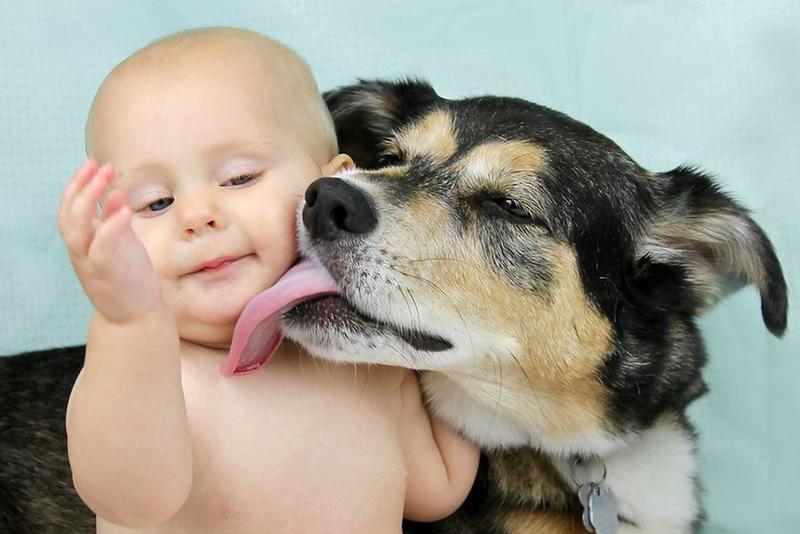
They like the way you taste. Dogs find something yummy about your sweaty, salty skin. That unique taste is also comforting because it comes from someone they love.
What did you do the last time your dog licked you? Likely you gave him attention by petting him or saying something to him, which offered positive reinforcement, encouraging him to do it again.
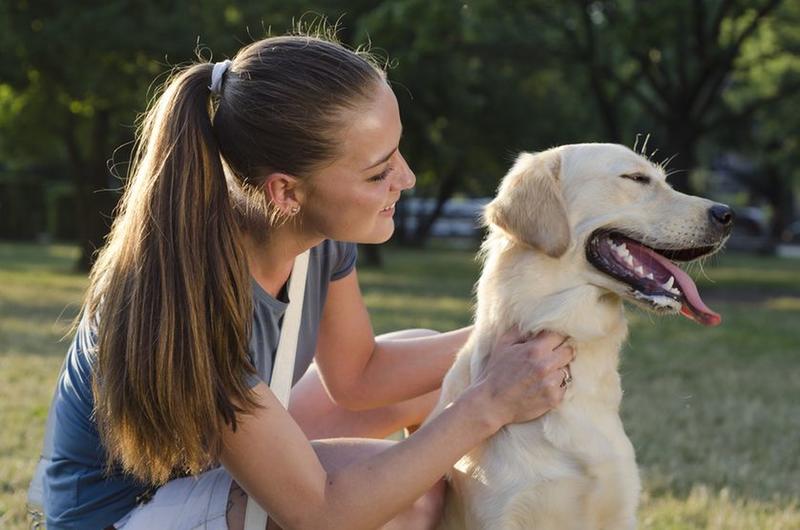
And, as the AKC points out, licking also releases endorphins (the “feel good” hormones), which increases the benefit of doing it.
Puppies will lick their mother's mouth as a sign of subordination. Similarly, a dog will lick another dog (or a person) that they feel is superior to them.
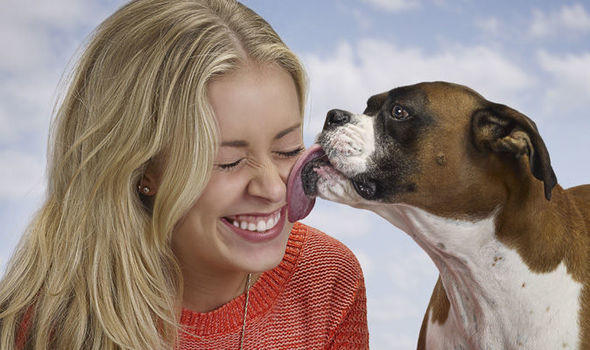
Also for medical or behavioral reasons. A dog might lick a certain spot on his body because of allergies or other medical problems. But a dog that obsessively licks himself, a person or even an item may have anxiety or a disorder that may benefit from a consultation with a behaviorist.
Your dog's mouth and intestines harbor all sorts of bacteria and parasites. Some of these are zoonotic, meaning they can be transmitted to people and can cause disease, says veterinarian Ken Tudor of PetMD. Some common bacteria that can be transmitted this way include salmonella, E. coli, clostridium and campylobacter, which can be found in a dog's intestines.
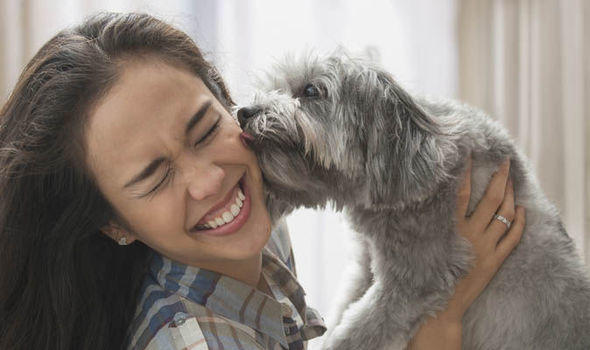
Because pets lick their bottoms, these bacteria can eventually end up in a dog's mouth and then possibly be transferred to people with a lick.
If you're healthy, a few dog licks likely won't make you sick, most experts appear to agree. “When dog saliva touches intact human skin, especially in a healthy person, it is extremely unlikely to cause any problems, as there will be very little absorption through the skin,” Dr. Leni K. Kaplan at Cornell University's College of Veterinary Medicine told the New York Times.
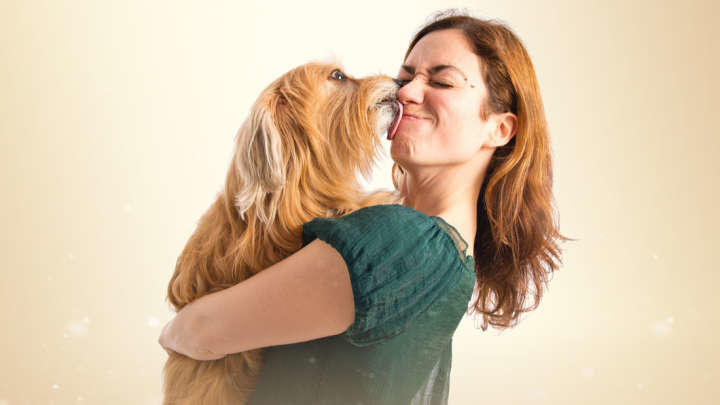
But because disease-carrying saliva can be absorbed more readily through the membranes in a person's mouth, eyes and nose, Kaplan suggests it's best to avoid letting your dog lick those parts of your face. It's rare that illnesses are spread that way, but it's still a wise precaution since the disease can be fatal.
For one man in Wisconsin, licks from his own dog led to a bacterial infection in his blood caused by capnocytophaga and ultimately his limbs were amputated. "This infection in his blood triggered a very severe response on his body," Dr. Silvia Munoz-Price, infectious disease specialist at the Medical College of Wisconsin, told FOX 6. "More than 99 percent of the people that have dogs will never have this issue. It's just chance."
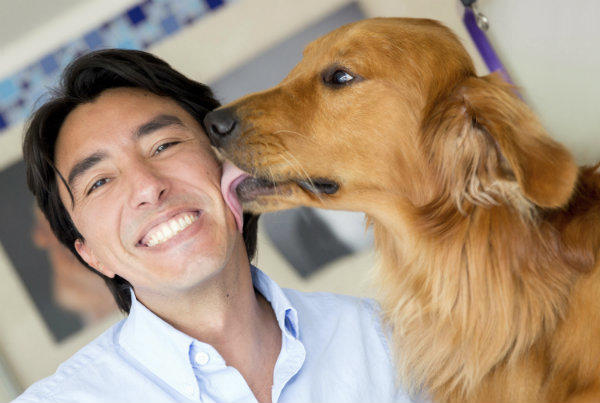
Just a few weeks after that, a woman in Wisconsin died from a capnocytophaga infection just two days after her new puppy nipped her and caused a small cut. "I was told she could get struck by lightning four times and live, win the lottery twice,” the woman's husband told WTMJ. "That's how rare this is supposed to be."
While these two cases are extremely rare, there are other reasons why you shouldn't let a dog lick you. Before you kiss a dog, or let a dog lick your face, “you have to think of where their nose has been,” veterinarian Clark Fobian, immediate past president of the American Veterinary Medical Association, tells WebMD. “Has it been inside a dead opossum on the side of the road, or the posterior of another dog, or in the litter box?”
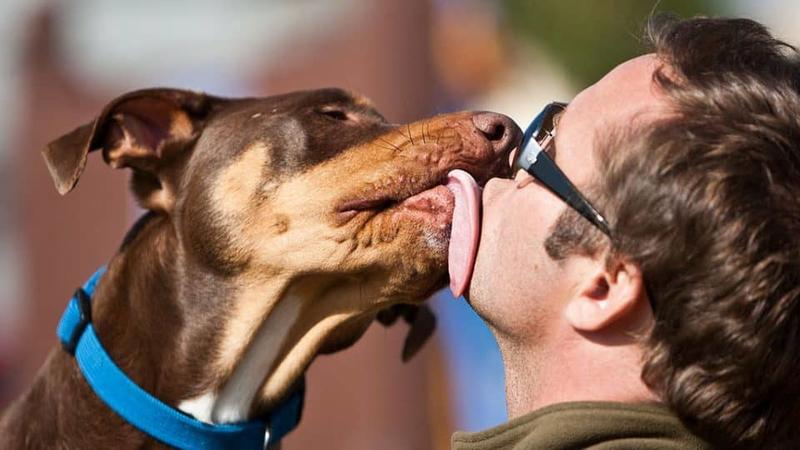
Fobian points out that you shouldn't think kissing your dog on his nose or the top of his head is much safer than on the mouth. If your dog has an infection, germs can travel all over his body through scratching, he says. And because dogs are constantly licking, whatever is on their mouth typically will end up on their skin, and vice versa.
If you have a compromised immune system — for example if you're on chemotherapy or have diabetes — you should definitely avoid the up-close-and-personal doggy mouth to mouth, Dr. Shelley Rankin, associate professor of microbiology at the University of Pennsylvania School of Veterinary Medicine, tells VetStreet.
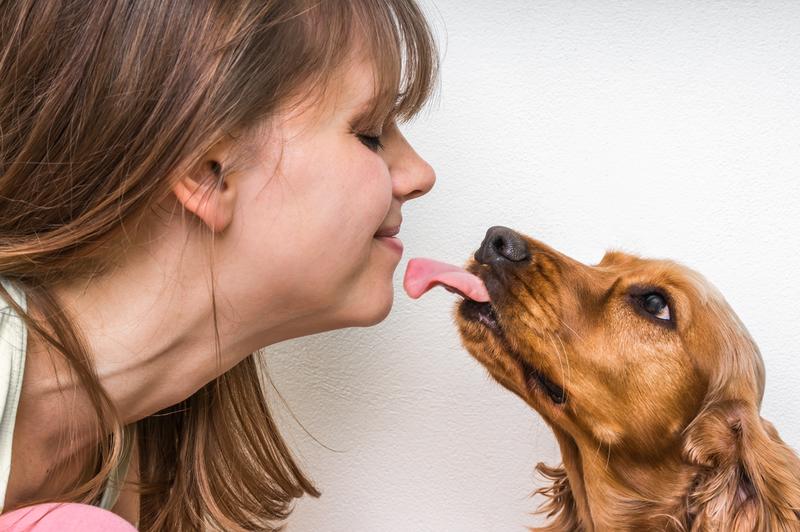
The same rule applies for pregnant women, babies, the elderly and anyone (like teenagers with acne) who have open sores on their faces. “Anywhere the skin is broken, there's potentially a risk," Rankin says.
To limit your chances of pet-related microbial issues, it's smart to take common sense health measures to keep you and your dog healthy. Here are some tips from the Companion Animal Parasite Council:
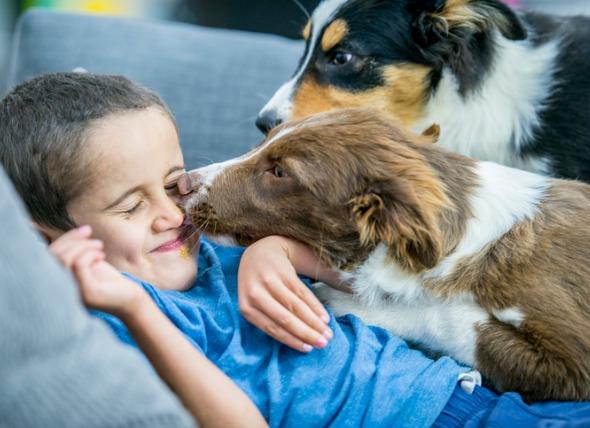
-Make sure your dog has regular heartworm, flea and tick control.
-Have your dog checked for parasites regularly and have puppies on a deworming program.
-Clean up immediately after your pet while on walks and in the yard.
-Wash your hands after cleaning up after your pet.
And use caution when sticking your face in front of any dog. Not all dogs want you that close and can show their stress by leaning or looking away or licking their lips. If you don't catch and respect those signs, a dog can eventually snap at you, veterinarian Melissa Bain, assistant professor at UC Davis School of Veterinary Medicine, tells WebMD.
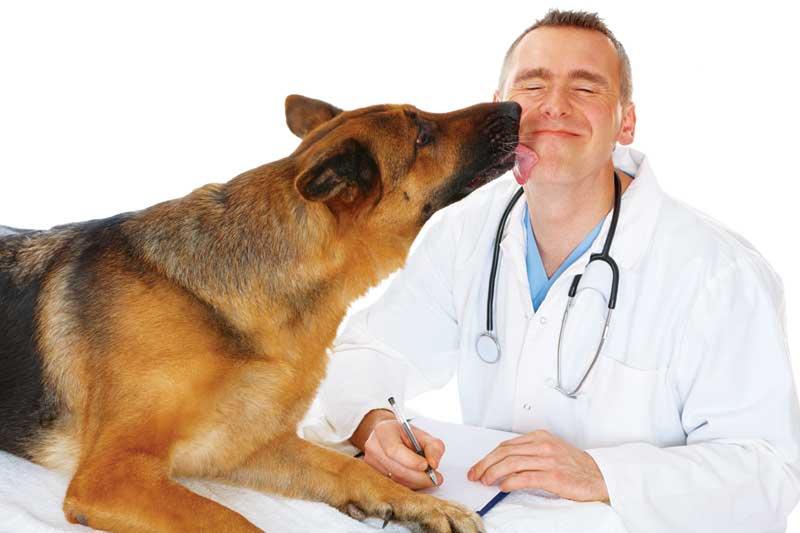
It's just like trying to kiss a person who doesn't want to be kissed. “We respect people who are like that; we should also respect dogs who are like that,” Bain says.
Well, maybe you do. Dogs will devour things you wouldn't eat for a million dollars. They lick their own genitals. They hover their faces over other animals' refuse and vacuum up the fumes.
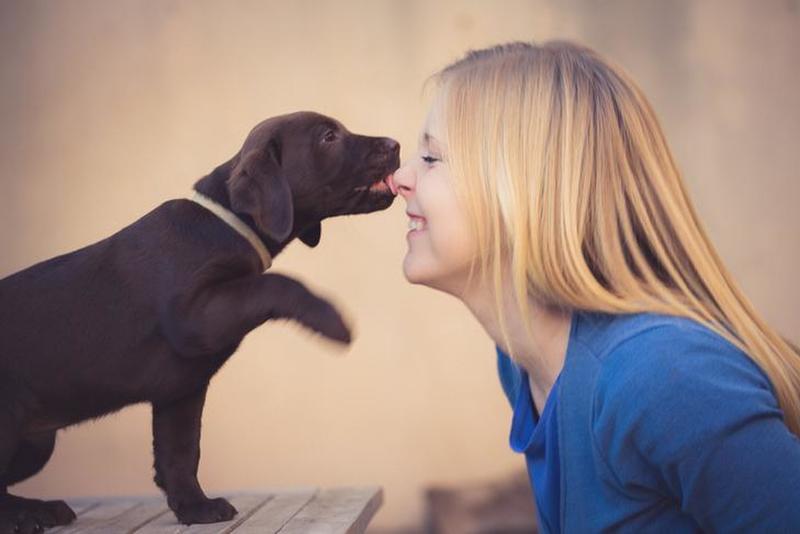
Let's face it: Dogs are pretty brazen when it comes to germs! Their bodies are equipped to handle this lifestyle, but ours may not be, and that's really the bottom line. Dogs' mouths sometimes contain bacteria and parasites that can make humans sick.
Most of the bacteria in your dog's mouth are harmless. But dogs can carry strains of zoonotic organisms—bacteria or parasites that can pass between animal species and cause disease. These types of organisms have sparked periodic outbreaks of diarrhea, and humans can pick up these pathogens from contact with dog saliva or feces.
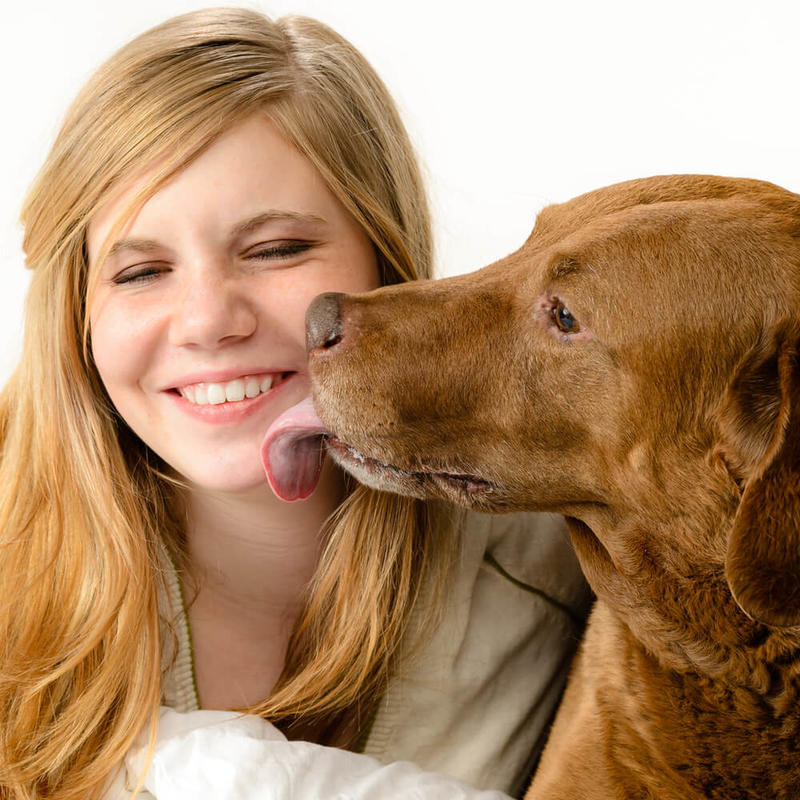
Salmonella, pasteurella, campylobacter, and leptospira are just a few of the most dangerous bacteria our dogs may be carrying. Dogs pick them up when sniffing (or eating) animal waste, or when drinking contaminated water from a puddle, stream, or pond. Many dogs carry the pathogens without showing symptoms or signs of illness.
Dogs can carry parasites as well as bacteria. Giardia, cryptosporidium, and hookworm can all cause diarrhea and intestinal upset. Dogs can also pass on ringworm, which creates a rash on the skin.
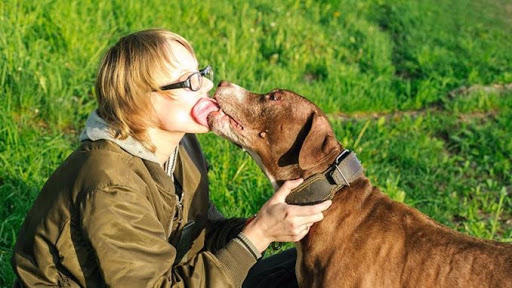
Some people conveniently say that a lick from a dog will improve your body's immune strength, but this logic doesn't hold up with parasites. If your dog is carrying these invaders, you can become infected repeatedly over time. While cases of infection are somewhat rare, the risk of contraction should give you pause.
These former first dogs, Bo and Sunny, are the most presidential dogs in the country. But even these refined cuties don't get to lick their owner's face.
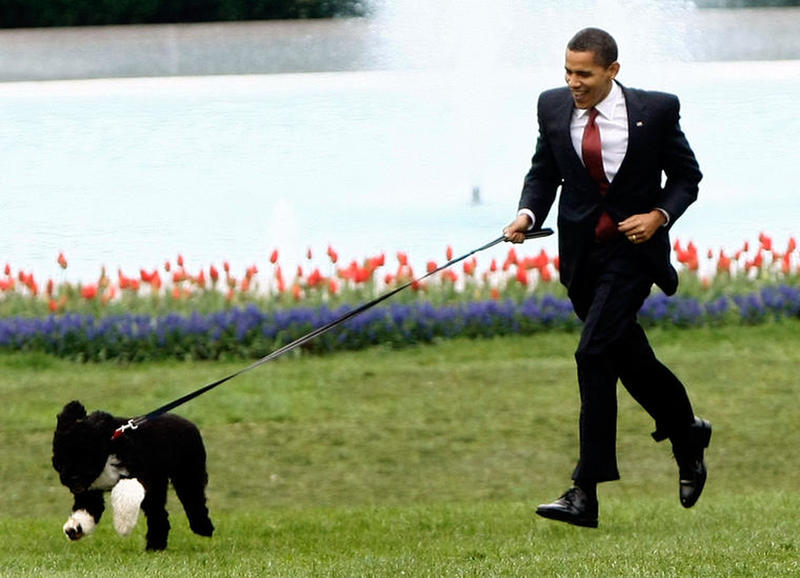
As President Obama told Wired Magazine, “I still don't let Sunny and Bo lick me because when I walk them on the side of the lawn, some of the things I see them picking up and chewing on—I don't want that, man.”
While you can't possibly tell which microscopic monsters might be living in your dog's mouth (unless you get his saliva tested), you can protect yourself from infection—to some extent. If you make sure your dog isn't licking on your mouth or around your nose, and if you wash your hands and face after a good kiss, you're better protected from possible illness.
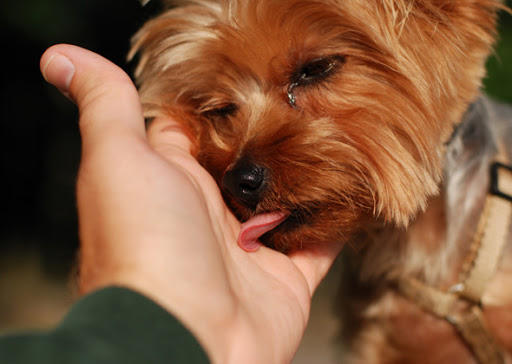
The bacteria mentioned above are more easily received by mucous membranes, like those in the mouth and nasal cavity. In other words, a kiss on the cheek (followed by a face wash!) rather than a lip-to-lip smooch is a smarter and safer way to get up close and personal with your dog.
The mental and emotional benefits of owning a dog come from the bond we feel with our pet. This is strengthened through interactions like play, shared activities, and physical affection. Belly rubs, hugs, and pets are part of this, but allowing your dog to give you an occasional kiss also reinforces the intimacy that helps us feel connected to our pet.
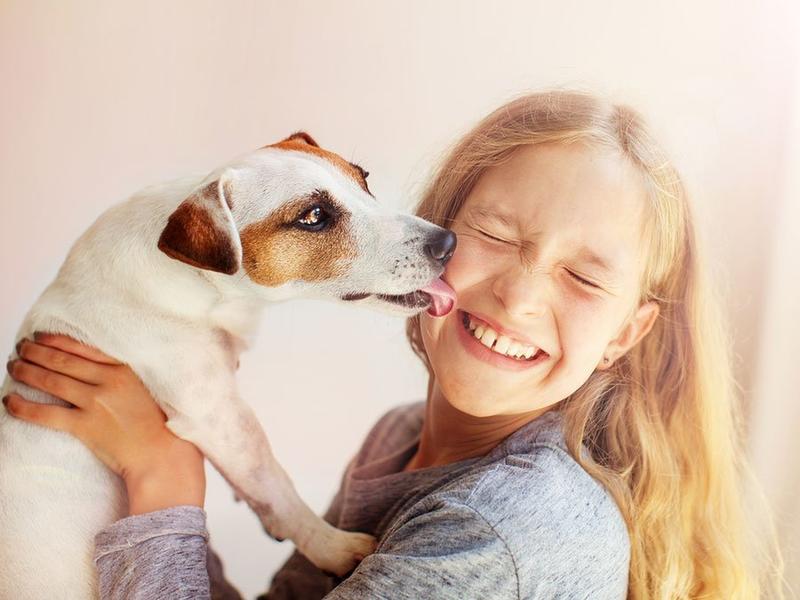
You don't need to stage a Hollywood kiss, but do what you feel comfortable with. Just remember to exercise caution!